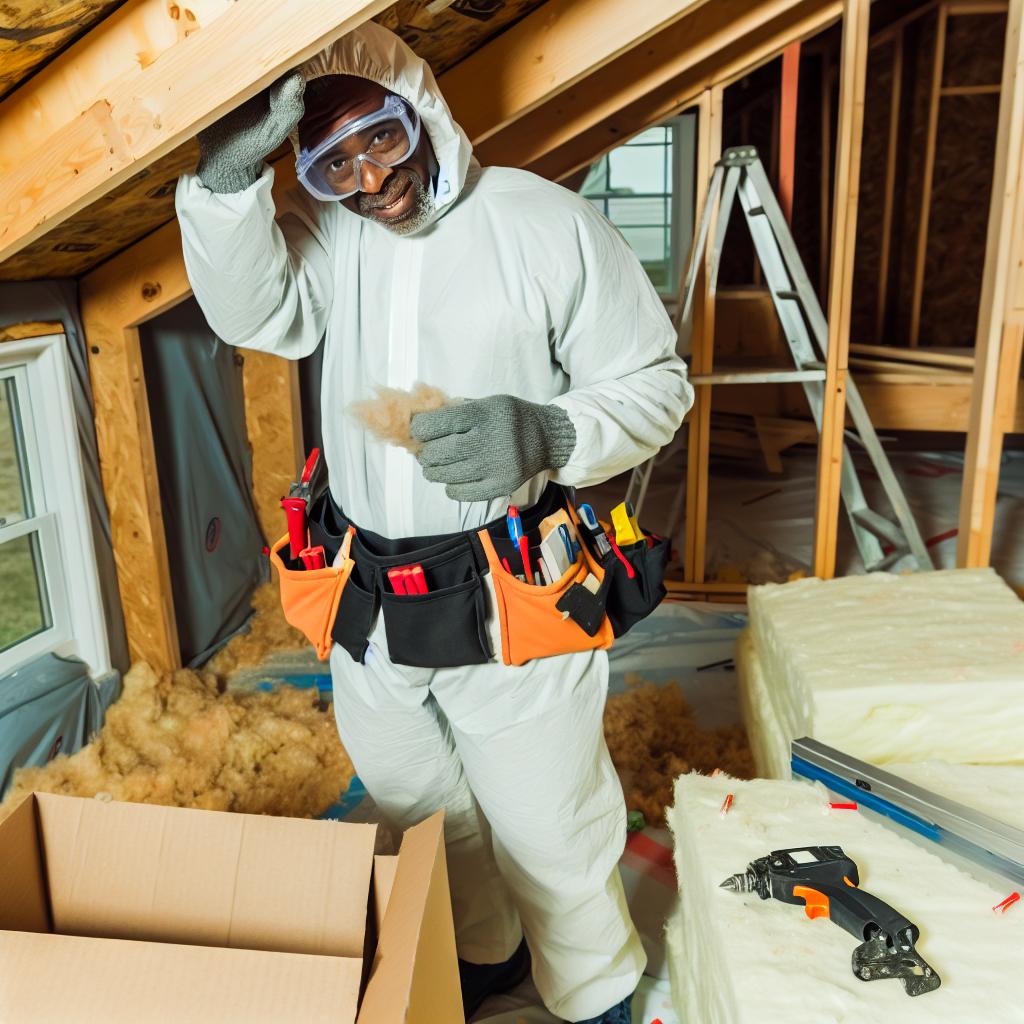Introduction:
An insulation worker plays a crucial role in ensuring buildings are energy-efficient and comfortable.
They are responsible for installing and replacing insulation materials in various structures.
Insulation workers are essential in the construction industry as they help regulate temperature, reduce energy costs, and improve indoor air quality.
Their work significantly impacts the overall efficiency and sustainability of buildings.
Skills required for an insulation worker:
As an insulation worker, you must possess a diverse set of skills in order to excel in this demanding role.
One of the key requirements for this job is a deep understanding of the various types of insulation materials available in the market.
From fiberglass to cellulose to foam, each material has its own unique properties and applications.
Being knowledgeable about these different options will enable you to select the most suitable insulation for each specific project.
Another essential skill for an insulation worker is the ability to interpret blueprints and technical drawings.
These documents provide crucial information about the layout and design of the building.
This helps you to accurately plan and install the insulation materials.
Moreover, a successful insulation worker must possess strong physical stamina and endurance.
This job often involves working in challenging environments, such as tight spaces or high altitudes.
Physical strength and resilience are essential to getting the job done effectively.
Attention to detail is also critical in the role of an insulation worker.
Ensuring accuracy in measurements and precise installation of insulation materials is crucial to the overall performance and efficiency of the building’s thermal insulation system.
By honing these essential skills and qualities, you can become a proficient and reliable insulation worker.
You will be capable of delivering high-quality results in every project you undertake.
- Knowledge of different types of insulation materials
- Ability to interpret blueprints and technical drawings
- Strong physical stamina and endurance
- Attention to detail and accuracy in measurements
Responsibilities of an insulation worker:
Insulation workers play a crucial role in ensuring that buildings are well-insulated to maintain comfortable temperatures and reduce energy costs.
Let’s delve deeper into the responsibilities of an insulation worker:
Transform Your Career Today
Unlock a personalized career strategy that drives real results. Get tailored advice and a roadmap designed just for you.
Start NowInstallation of insulation materials:
One of the primary responsibilities of an insulation worker is to install various types of insulation materials in residential and commercial buildings.
This includes fiberglass, cellulose, foam, and reflective insulation.
The proper installation of these materials helps regulate indoor temperatures and reduce energy consumption.
Seal gaps and cracks:
Insulation workers are tasked with sealing gaps and cracks in buildings to prevent air leakage and ensure maximum energy efficiency.
By effectively sealing these openings, insulation workers help maintain a consistent indoor temperature.
They also improve air quality and reduce energy costs for property owners.
Use of specialized tools and equipment:
To perform their duties effectively, insulation workers utilize specialized tools and equipment.
This includes blowers, cutting machines, and protective gear.
These tools enable workers to install insulation materials accurately and seal gaps efficiently.
They ensure the overall effectiveness of the insulation system in a building.
Adherence to safety regulations:
Insulation workers must prioritize safety while carrying out their tasks.
They are required to follow strict safety regulations and protocols to prevent accidents and injuries on the job.
This includes wearing appropriate safety gear, handling insulation materials correctly, and maintaining a safe work environment at all times.
Uncover the Details: Balancing Cost and Service in Warehouse Management
Importance of communication skills:
Effective communication is vital for insulation workers to successfully carry out their responsibilities.
Here are some reasons why good communication skills are essential:
Collaboration with other construction workers and contractors:
Insulation workers need to work closely with other construction professionals such as electricians, plumbers, and HVAC technicians to ensure that the building is properly insulated.
Clear communication is key to coordinating tasks and ensuring that everyone is on the same page.
Ability to follow instructions and work as part of a team:
Insulation workers must be able to understand and follow instructions from supervisors or project managers.
This includes reading blueprints, following safety protocols, and completing tasks according to specifications.
Transform Your Career Today
Unlock a personalized career strategy that drives real results. Get tailored advice and a roadmap designed just for you.
Start NowGood communication skills help in clarifying any doubts and seeking guidance when needed.
Communicate effectively with supervisors and clients:
Insulation workers need to provide progress updates, report any issues, and discuss project requirements with their supervisors.
Additionally, they may need to communicate with clients to address any concerns or provide explanations about the insulation process.
Clear and concise communication can help in building trust with both supervisors and clients.
Communication skills play a crucial role in the success of insulation workers.
By fostering effective communication, workers can improve collaboration, ensure tasks are completed accurately, and maintain positive relationships with supervisors and clients.
Delve into the Subject: Salary Expectations for Construction Managers
Training and certification requirements:
When it comes to becoming an insulation worker, there are certain training and certification requirements that you need to meet.
Let’s delve into the essential skills and responsibilities in this field.
Completion of on-the-job training or apprenticeship programs
Insulation workers typically start their careers by completing on-the-job training or apprenticeship programs.
These training programs provide hands-on experience and knowledge of various insulation materials and installation techniques.
During the training period, aspiring insulation workers learn how to safely handle insulation materials, use tools and equipment, and understand building codes and regulations related to insulation installation.
Certification in insulation installation may be required in some states
In addition to on-the-job training, some states may require insulation workers to obtain certification in insulation installation.
This certification ensures that workers have the necessary skills and knowledge to perform their duties effectively and safely.
To obtain certification, insulation workers may need to pass a written exam and demonstrate their practical skills in insulation installation.
Certification requirements vary by state, so it’s important to check with your local authorities to understand the specific requirements in your area.
Ongoing education and training to stay updated on new techniques and materials
As technology advances and new insulation materials and techniques emerge, it’s crucial for insulation workers to stay updated on the latest developments in the field.
Continuous education and training are essential to ensure that workers are equipped with the skills and knowledge needed to meet industry standards and requirements.
Insulation workers can stay updated by attending workshops, seminars, and training programs offered by industry organizations and manufacturers.
These opportunities provide valuable insights into new insulation products, installation techniques, and safety regulations.
Transform Your Career Today
Unlock a personalized career strategy that drives real results. Get tailored advice and a roadmap designed just for you.
Start NowTraining and certification are essential components of a successful career as an insulation worker.
By completing on-the-job training, obtaining certification, and staying updated on industry developments, insulation workers can enhance their skills and advance their careers in this dynamic field.
You Might Also Like: How to Achieve Perfect Grout Lines: Tips and Tricks
Environmental Considerations
Insulation workers must have knowledge of environmental regulations regarding insulation materials to ensure compliance with legal requirements.
It is crucial for them to stay updated on any changes in these regulations to avoid any violations.
- Knowledge of environmental regulations regarding insulation materials
Insulation workers should also be well-versed in the use of eco-friendly and sustainable insulation options.
This includes utilizing materials that have minimal impact on the environment and promoting energy efficiency in buildings.
- Use of eco-friendly and sustainable insulation options
Disposal of waste materials is another important aspect that insulation workers need to consider.
It is essential for them to dispose of waste in accordance with environmental guidelines to minimize the impact on the environment.
- Disposal of waste materials in accordance with environmental guidelines
Insulation workers play a significant role in creating energy-efficient and environmentally friendly buildings.
By adhering to environmental considerations, they can contribute to a more sustainable future.
Discover More: Seasonal Work Patterns for Lumberjacks

Challenges faced by insulation workers:
- Working in extreme temperatures and confined spaces
- Potential exposure to hazardous materials such as fiberglass and asbestos
- Physical strain from lifting heavy materials and working at heights
Working in extreme temperatures and confined spaces:
Insulation workers often find themselves working in environments with extreme temperatures.
Whether it’s scorching hot in the summer or freezing cold in the winter, these workers must adapt to the conditions to get the job done.
Additionally, they often work in confined spaces such as attics or crawl spaces, which can be uncomfortable and challenging.
Potential exposure to hazardous materials such as fiberglass and asbestos:
One of the major challenges faced by insulation workers is the potential exposure to hazardous materials like fiberglass and asbestos.
These materials can be harmful to their health if proper precautions are not taken.
Insulation workers must wear protective gear and follow safety protocols to minimize the risks associated with these materials.
Physical strain from lifting heavy materials and working at heights:
Insulation work involves lifting heavy materials such as insulation batts and rolls, which can put a strain on the body, especially the back and shoulders.
Additionally, insulation workers often have to work at heights, which can increase the risk of falls and injuries.
Transform Your Career Today
Unlock a personalized career strategy that drives real results. Get tailored advice and a roadmap designed just for you.
Start NowProper lifting techniques and safety equipment are essential to prevent injuries.
Career growth opportunities:
When it comes to being an insulation worker, there are plenty of opportunities for career growth and advancement.
These opportunities can allow you to take your skills and expertise to the next level, opening up new possibilities for your professional development.
Potential for advancement to lead insulation installer or supervisor roles
One of the main career growth opportunities for insulation workers is the potential to advance to lead installer or supervisor positions.
This progression allows you to take on more responsibility, oversee projects, and supervise a team of workers.
It can be a great way to demonstrate leadership skills and showcase your ability to manage and coordinate insulation installations efficiently.
Specialization in specific types of insulation materials or techniques
Another avenue for career growth is to specialize in specific types of insulation materials or techniques.
By becoming an expert in a particular area, such as spray foam insulation or soundproofing techniques, you can differentiate yourself in the industry.
This can lead to higher-paying jobs and more opportunities for projects that align with your expertise.
Entrepreneurial opportunities for starting an insulation contracting business
For those with an entrepreneurial spirit, there is also the opportunity to start your own insulation contracting business.
By branching out on your own, you can set your own schedule, choose your clients, and build a business that reflects your values and expertise.
This path can be challenging but incredibly rewarding, allowing you to grow your business and establish yourself as a reputable insulation contractor in the industry.
The career growth opportunities for insulation workers are vast and varied.
Whether you choose to advance to leadership roles, specialize in specific areas of insulation, or start your own business, there are plenty of ways to take your career to the next level.
Remember to stay proactive, continue learning, and seize opportunities as they arise to make the most of your career in the insulation industry.
Essential Skills and Responsibilities of Insulation Workers
Insulation workers must have excellent knowledge of insulation materials and installation techniques.
They need to be physically fit and able to work in various environments.
Attention to detail is crucial to ensure insulation is properly installed.
Good communication skills are essential for working with contractors and clients.
Insulation workers must adhere to safety guidelines to prevent accidents on the job.
Transform Your Career Today
Unlock a personalized career strategy that drives real results. Get tailored advice and a roadmap designed just for you.
Start NowThey are responsible for measuring, cutting, and installing insulation materials accurately.
Problem-solving skills are necessary to address any challenges that may arise during installation.
Teamwork is key in collaboration with other construction workers on projects.
Encouragement for Individuals Interested in Pursuing a Career in Insulation Installation
Considering a career as an insulation worker can be a rewarding choice for those who enjoy hands-on work and have a passion for creating energy-efficient buildings.
With the right training and dedication, individuals can excel in this field and contribute to making homes and buildings more comfortable and sustainable for future generations.




